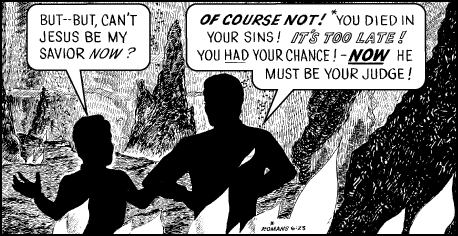Rachel Held Evans points us to “95 Tweets Against Hell” from Two Friars and a Fool:
Here are all of our 95 tweets, categorized by the kind of argument they are making – ethical, theological and biblical, in that order. What it boils down to is that there is no ethical justification for Hell whatsoever, no good theological reason to posit a doctrine of Hell, and there are literally hundreds of Biblical passages that do not support an eternal Hell of conscious torment. … We did not even scratch the surface of the ethical, theological and interpretive work done to contend against the doctrine of eternal Hell.
Two Friars and a Fool’s Aric Clark also brings us “Why Believing in Hell Makes You a Demon,” which argues along the same lines as the earlier post here, “The paradox of pitchforks, a devilish problem,” in which I noted that:
Only a demon — a monstrous, soulless, malevolent and wholly unholy creature — could devote itself to eternal torture, unrestrained by mercy, unhampered by revulsion or repugnance.
And thus we come to the paradox of pitchforks. Any creature capable of eternally wounding another creature with a pitchfork lacks the authority to wield that pitchfork, rightfully belonging at the other end of it. The pointy, business end of it.
Ultimately if you believe in Hell you are betraying the truth about yourself — that if the gavel was in your hands you would condemn certain people to eternal torture. We have a name for the beings that would engage in the torture of souls — demons.
Elsewhere in Hell news, Kurt Willems happily decides it’s not too late to weigh in on the controversy surrounding Rob Bell’s book Love Wins, and he’s seven posts into a series on “Hell Yes. Hell No! Or Who the Hell Cares?”
And, via the wonderful tumblr AZspot, I find this reflection from Jeremy Myers, “The Church Should Go to Hell” and his follow-up post on “Our Deal With the Devil.”
(The post title, again, comes from one of the greatest passages that the great Mark Twain ever wrote.)












